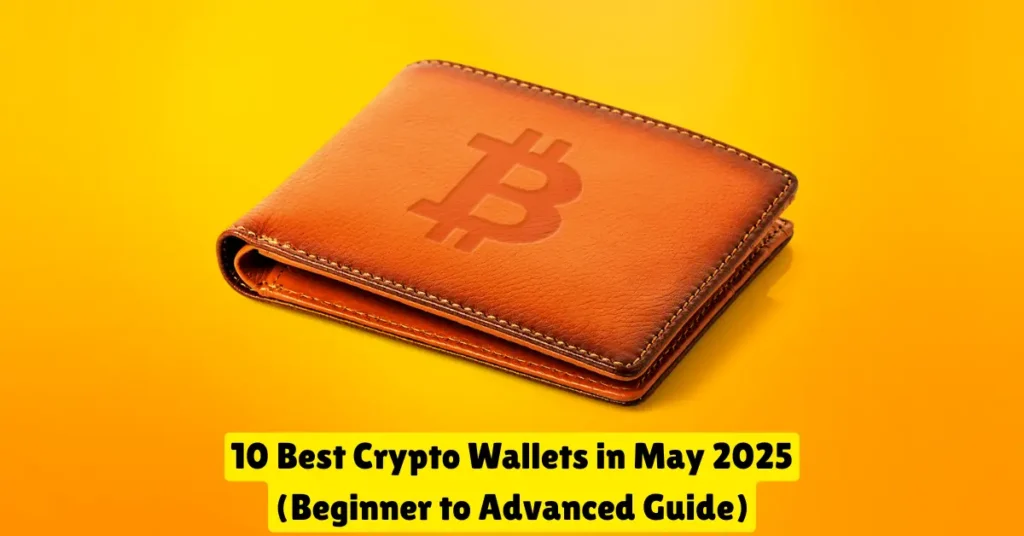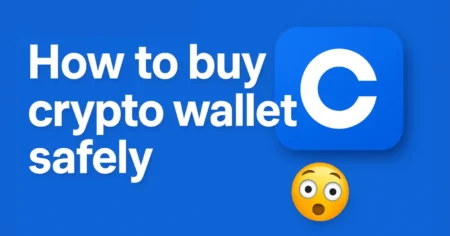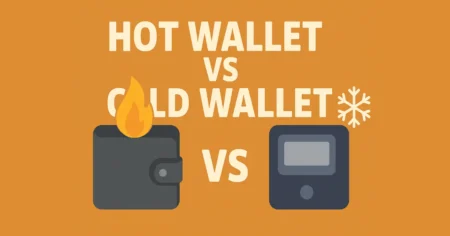10 Best Crypto Wallets in May 2025:
Introduction
Cryptocurrency is no longer a niche concept. It has entered the mainstream, attracting everyone from retail investors to institutional players. However, with the rise in adoption comes a surge in scams, hacks, and security breaches, making one question more important than ever:
Where should I safely store my crypto?
If you’re a beginner, enthusiast, or investor looking to step into the crypto space in 2025, choosing the right wallet is the first and most critical step. This comprehensive guide will walk you through everything you need to know from wallet basics to the best options available in 2025 so you can make informed, confident decisions about your digital assets.
What Is a Crypto Wallet?
A crypto wallet is a tool software-based or hardware-based that allows you to securely store, send, and receive cryptocurrencies. But unlike traditional wallets that hold physical money, crypto wallets store private and public keys, which are essential for accessing and managing your funds on the blockchain.
Key Components:
- Public Key – This is like your bank account number. You can share it to receive crypto.
- Private Key – This is like your ATM PIN. Anyone with this can access your crypto. It must be kept secure and confidential.
⚠️ If you lose your private key or seed phrase, you permanently lose access to your funds. There’s no “forgot password” option.
There are two major approaches:
- Custodial Wallets: Your private keys are stored by a third party (usually an exchange). Easier to use, but less control.
- Non-Custodial Wallets: You are in full control of your private keys. More secure, but also more responsibility.
List of Wallets Covered in This Guide
Here is a quick snapshot of all wallets you’ll read about in this guide, along with their core benefits:
- Exodus Wallet – Stylish, Multi-Coin, Free, Built-In Exchange
- Zengo Wallet – No Seed Phrase, Biometric Login, Secure Cloud, Beginner-Friendly
- MetaMask – Ethereum-Based, Web3 Ready, DeFi Access, Free
- Trust Wallet – NFT Support, Mobile-First, Easy Setup, Staking Rewards
- Ledger Nano X – Cold Storage, Bluetooth Access, High-Security, Long-Term Use
- Trezor Model One – Hardware-Based, Open Source, PIN Protected, Affordable
- Electrum Wallet – Bitcoin-Only, Lightweight, Custom Fees, Speedy
- Coinbase Wallet – Web & Mobile, DApp Access, Built-In Exchange, Secure Login
- Atomic Wallet – Multi-Asset, Desktop Ready, Staking Features, Private
- Rabby Wallet – Browser-Based, Multi-Chain, DeFi Focused, Secure UX
Types of Crypto Wallets
Let’s break down the wallet types, from beginner-friendly options to those suited for advanced users and long-term storage.
🔥 Hot Wallets
Hot wallets are always connected to the internet, making them ideal for frequent transactions.
Use Case:
- Daily traders
- Short-term holders
- Beginners who need easy access
Pros:
- Instant access
- Easy to set up
- Free options available
Cons:
- Vulnerable to malware and phishing
- Less secure for large amounts
Common Hot Wallets:
MetaMask, Trust Wallet, Zengo, Coinbase Wallet
❄️ Cold Wallets
Cold wallets are offline storage solutions designed for maximum security.
Use Case:
- Long-term investors (HODLers)
- People storing large sums
Pros:
- Immune to online threats
- Great for secure storage
Cons:
- Less convenient
- Higher upfront cost
Common Cold Wallets:
Ledger Nano X, Trezor Model One
🖥️ Desktop Wallets
Software-based wallets installed on your PC or laptop. Ideal for users who prefer more control and privacy.
Use Case:
- Desktop-first users
- Those needing privacy and control
Pros:
- Better privacy
- High customizability
Cons:
- If your computer is compromised, so is your wallet
Common Examples:
Electrum, Atomic Wallet
📱 Mobile Wallets
Apps that turn your smartphone into a fully functional crypto wallet.
Use Case:
- On-the-go users
- People who prefer app-based solutions
Pros:
- Biometrics like Face ID or fingerprint
- Push notifications
- In-app exchange in some cases
Cons:
- Dependent on phone security
- High risk if phone is lost
Popular Apps:
Zengo, Trust Wallet, Coinbase Wallet
🌐 Web Wallets
Wallets accessible via browser no installation needed.
Use Case:
- Users who want quick, browser-based access
Pros:
- Accessible from any device
- Beginner-friendly
Cons:
- Most vulnerable to phishing and hacking
- Often custodial
Common Platforms:
Blockchain.com, Coinbase (Web), Rabby Wallet
🔒 Hardware Wallets
Physical devices that store your private keys offline a form of cold storage.
Use Case:
- Security-focused investors
- People storing large crypto amounts
Pros:
- Top-tier security
- Resistant to physical tampering
Cons:
- Can be lost or damaged
- Costs money (typically $60–$150)
Trusted Brands:
Ledger, Trezor
Exodus Wallet
Type: Hot Wallet | Platforms: Desktop, Mobile
Exodus is one of the most user-friendly wallets in the crypto ecosystem, designed for beginners and intermediate users alike. It supports over 260 cryptocurrencies, including Bitcoin, Ethereum, Solana, and many ERC-20 tokens.
Key Features:
- Built-in Exchange: Swap crypto directly inside the wallet with no KYC.
- Portfolio Tracker: Visual graphs and stats for asset performance.
- 24/7 Live Support: Rare among wallet providers.
- Staking Options: Earn passive income on assets like ADA, SOL, and ALGO.
Security:
- Non-custodial: You control your keys.
- Password protected with 12-word recovery phrase.
- No 2FA or hardware integration not for high-value storage.
Best For:
- New crypto investors
- People looking for a balance of usability and features
Limitations:
- Not open source
- Doesn’t support custom gas fees
- Hot wallet = online risk
🌐 Where to Get It:
Download directly from the official website. Available for Windows, macOS, Linux, iOS, and Android.
Zengo Wallet
Type: Hot Wallet (Mobile only) | Security: MPC (No seed phrase)
Zengo stands out with its no-seed-phrase technology powered by MPC (Multi-Party Computation). This means your wallet is secured by your biometric data (Face ID) instead of the traditional 12/24-word phrases.
Key Features:
- No Seed Phrase: No fear of losing secret words.
- 24/7 In-App Human Support
- Built-In Web3 Firewall: Warns you about risky DApps.
- Instant Crypto Purchase: Buy with card, Apple Pay, Google Pay.
Security:
- Face ID required to approve all actions
- Encrypted cloud backup of recovery kit
- Tiered security levels (Basic, Pro)
Best For:
- Users who lose passwords often
- Beginners who want simple setup with no risk of losing keys
Limitations:
- Closed source
- Mobile-only
- Small number of supported tokens (but growing)
Where to Get It:
🌐 Download Zengo Wallet from the App Store or Google Play. Setup takes 2 minutes.
MetaMask
Type: Browser Extension + Mobile App | Ideal For: Ethereum Ecosystem
MetaMask is the go-to wallet for accessing Ethereum, DeFi, and NFTs. It acts as a bridge to decentralized apps (DApps), letting users interact directly with smart contracts.
Key Features:
- Connects to DApps: DeFi, NFT platforms, Web3 games
- Custom RPC Support: Add other EVM-compatible networks (e.g., BNB Chain, Polygon)
- In-Wallet Swaps: Access tokens without leaving the app
- Seed Phrase Security
Security:
- Non-custodial
- Requires strong password + seed phrase
- Can connect to hardware wallets (Ledger, Trezor)
Best For:
- DeFi traders
- NFT collectors
- Ethereum ecosystem users
Limitations:
- Doesn’t support Bitcoin or Solana
- Vulnerable if browser is compromised
- Complex for total beginners
🌐 Where to Get It:
Install MetaMask from Chrome Web Store or mobile stores.
Trust Wallet
Type: Mobile Wallet | Supported Chains: 60+
Trust Wallet is a multi-chain mobile wallet officially backed by Binance. It supports NFTs, staking, and DApps all within one app.
Key Features:
- In-App DApp Browser
- NFT Support: Ethereum and BNB Chain NFTs
- Staking: Earn rewards on ATOM, BNB, TRX, etc.
- Multi-Coin Support: BTC, ETH, BNB, SOL, and thousands more
Security:
- Private keys stored locally
- Biometric lock supported
- Non-custodial, but no desktop version
Best For:
- Mobile-first users
- People active in NFT and BSC ecosystem
Limitations:
- Not open-source anymore (since Binance acquisition)
- Lacks advanced DeFi tools compared to MetaMask
🌐 Where to Get It:
Download from trustwallet.com or app stores.
Ledger Nano X
Type: Hardware Wallet | Price: ~$149
Ledger Nano X is a premium cold wallet for users who prioritize security above all. It features a secure chip and Bluetooth support, allowing you to manage crypto via your phone or desktop.
Key Features:
- Bluetooth Enabled: Manage assets from your smartphone
- Secure Element Chip (CC EAL5+)
- Ledger Live App: For portfolio management, staking, buying crypto
- Wide Support: 5,500+ assets including Bitcoin, Ethereum, XRP, DOT
Security:
- Cold storage: Fully offline
- PIN + optional passphrase
- Tamper-proof design
Best For:
- Long-term holders
- People with large crypto portfolios
Limitations:
- Paid device
- Ledger faced backlash in 2023 over the “Recover” feature announcement
🌐 Where to Buy:
Only buy from the official Ledger store never from Amazon or resellers to avoid compromised devices.
Trezor Model One
Type: Hardware Wallet | Price: ~$69
Trezor Model One is one of the oldest and most trusted hardware wallets in the crypto world. Developed by SatoshiLabs, it offers a secure offline environment for storing your assets perfect for investors focused on long-term safety.
Key Features:
- Open Source Firmware: Regularly audited by the community.
- PIN & Passphrase: Dual-layer protection.
- Coins Supported: BTC, ETH, LTC, BCH, and 1,000+ others.
- Trezor Suite App: Interface for sending, receiving, and managing crypto.
Security:
- Never exposes private keys to the internet.
- Recovery seed and passphrase options.
- Supports Shamir Backup for added recovery strength.
Best For:
- Security-first users
- HODLers and long-term investors
Limitations:
- Doesn’t support iOS (USB-only access)
- No support for some newer tokens like XRP
🌐 Where to Buy:
Buy from trezor.io to avoid tampered devices. Never purchase from resellers or marketplaces.
Electrum Wallet
Type: Desktop Hot Wallet (Bitcoin Only) | OS: Windows, macOS, Linux
Electrum is a lightweight Bitcoin wallet built for speed, control, and customization. It’s one of the most trusted names in the BTC space, favored by experienced users and developers.
Key Features:
- Custom Transaction Fees: Full control over fee settings.
- Hardware Integration: Works with Ledger, Trezor.
- Multi-Signature Support
- Seed Phrase + Encryption
Security:
- Local storage of private keys
- Optional 2FA and cold storage setups
- Encrypted wallet file
Best For:
- Hardcore Bitcoin users
- Traders needing full control over transactions
Limitations:
- Bitcoin-only (no altcoin support)
- Outdated UI
- Not beginner-friendly
🌐 Where to Download:
Get the latest version directly from electrum.org to avoid phishing scams.
Coinbase Wallet
Type: Hot Wallet | Owned by: Coinbase (But Non-Custodial)
Coinbase Wallet is separate from your Coinbase exchange account. It’s a non-custodial wallet that gives users access to DApps, DeFi, NFTs, and more all without needing a centralized exchange.
Key Features:
- Web3 DApp Integration
- NFT Browser & Storage
- In-App Swap Feature
- Seed Phrase Based Security
Security:
- Private keys stored locally
- 2FA and biometric security
- Backup via seed phrase
Best For:
- People using Coinbase exchange
- Users exploring DApps and NFTs
Limitations:
- Doesn’t support as many assets as MetaMask or Trust Wallet
- Some features limited to mobile app
🌐 Where to Download:
Download from coinbase.com/wallet or official app stores.
Atomic Wallet
Type: Desktop + Mobile Hot Wallet | In-App Exchange
Atomic Wallet is a multi-asset non-custodial wallet offering a clean UI, staking, and private key ownership. It supports over 500 coins and tokens, making it an excellent option for those with diverse portfolios.
Key Features:
- Staking: ATOM, ZIL, BNB, and more.
- In-Wallet Crypto Purchases: Supports credit card buying.
- No Registration: True non-custodial experience.
- Atomic Swaps: Peer-to-peer exchange without middlemen (limited tokens)
Security:
- Encrypted private keys stored on device
- Seed phrase recovery
- No cloud sync = more local control
Best For:
- Users seeking wide token support
- Investors interested in staking rewards
Limitations:
- Closed source
- No hardware wallet integration
- Not ideal for complete crypto beginners
🌐 Where to Get:
Visit atomicwallet.io for downloads and tutorials.
Rabby Wallet
Type: Web Extension Wallet | Built for: Multi-Chain DeFi
Rabby is a next-generation browser wallet designed specifically for DeFi users. Created by DeBank, it focuses on multi-chain support and superior UI for interacting with decentralized apps securely.
Key Features:
- Automatic Chain Switching: No manual RPC hassle.
- Pre-Transaction Simulation: Know what will happen before you click “confirm.”
- Multi-Chain Support: Ethereum, Arbitrum, Optimism, Polygon, and more.
- Private Key Ownership
Security:
- Locally stored encrypted keys
- Simulation engine prevents malicious contract approvals
- Open source on GitHub
Best For:
- Active DeFi users
- Advanced Web3 participants
Limitations:
- Not for beginners
- No mobile or hardware wallet integration
🌐 Where to Install:
Rabby is available via rabby.io. Only install from official sources.
🧠 Additional Learning Resources (Based on Links in Original Guide)
In the original blog, various helpful guides and tools were linked to support beginner users. Here’s how we’ve covered that information directly within this blog for your benefit:
Crypto Wallet vs Exchange: What’s the Difference?
- Exchanges hold custody of your funds. You’re trusting them with your crypto.
- Wallets give you full control, but with that comes full responsibility.
- For investing, use wallets. For quick trades or conversions, exchanges work.
How to Keep Your Crypto Safe:
- Use hardware wallets for long-term holding.
- Enable biometric security and 2FA on hot wallets.
- Always download wallets from official sites.
- Keep your recovery phrase offline and never share it.
Seed Phrase vs Private Key vs Password:
- Seed Phrase: The master key to regenerate your wallet.
- Private Key: Unique to each asset address; used to sign transactions.
- Password: Local protection layer can be changed, but seed cannot.
List of Wallets Covered in This Guide
Here is a quick snapshot of all wallets you’ll read about in this guide, along with their core benefits:
- Exodus Wallet – Stylish, Multi-Coin, Free, Built-In Exchange
- Zengo Wallet – No Seed Phrase, Biometric Login, Secure Cloud, Beginner-Friendly
- MetaMask – Ethereum-Based, Web3 Ready, DeFi Access, Free
- Trust Wallet – NFT Support, Mobile-First, Easy Setup, Staking Rewards
- Ledger Nano X – Cold Storage, Bluetooth Access, High-Security, Long-Term Use
- Trezor Model One – Hardware-Based, Open Source, PIN Protected, Affordable
- Electrum Wallet – Bitcoin-Only, Lightweight, Custom Fees, Speedy
- Coinbase Wallet – Web & Mobile, DApp Access, Built-In Exchange, Secure Login
- Atomic Wallet – Multi-Asset, Desktop Ready, Staking Features, Private
- Rabby Wallet – Browser-Based, Multi-Chain, DeFi Focused, Secure UX
Final Thoughts
Choosing the right crypto wallet is not just a technical decision it’s a security investment. Whether you’re buying Bitcoin for the first time or managing a diverse DeFi portfolio, the wallets in this guide cover every kind of user and use case in 2025.
Take your time, evaluate your needs, and always prioritize control, security, and official sources.
Also read
- What is a Crypto Wallet and How Does It Work? – Coinsify
- 10 Crypto Terms Every Beginner Must Know – Coinsify
- What is Blockchain Technology – Complete Guide – Coinsify
- How to Buy Crypto Safely in 2025 – Complete Guide – Coinsify
- Bitcoin vs Ethereum: Key Differences Explained – Complete Guide
- Ultimate Blockchain Glossary: Learn Blockchain Terms Easily
- How to Buy Bitcoin Safely (Complete Beginner’s Guide)
- Top 10 Crypto Wallets for Beginners (2025 Edition)
- What is Cryptocurrency? A Beginner-Friendly Guide (2025)






